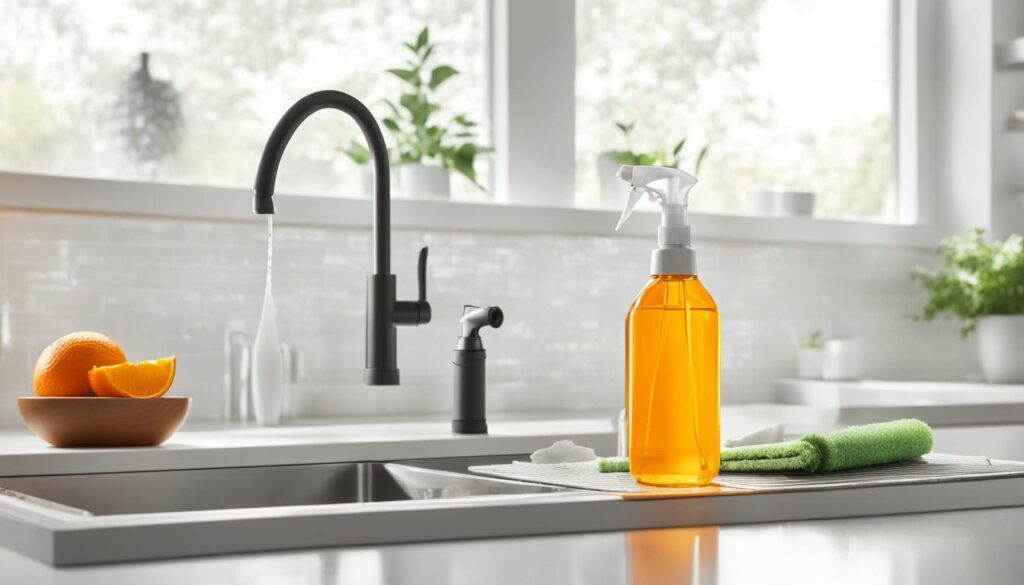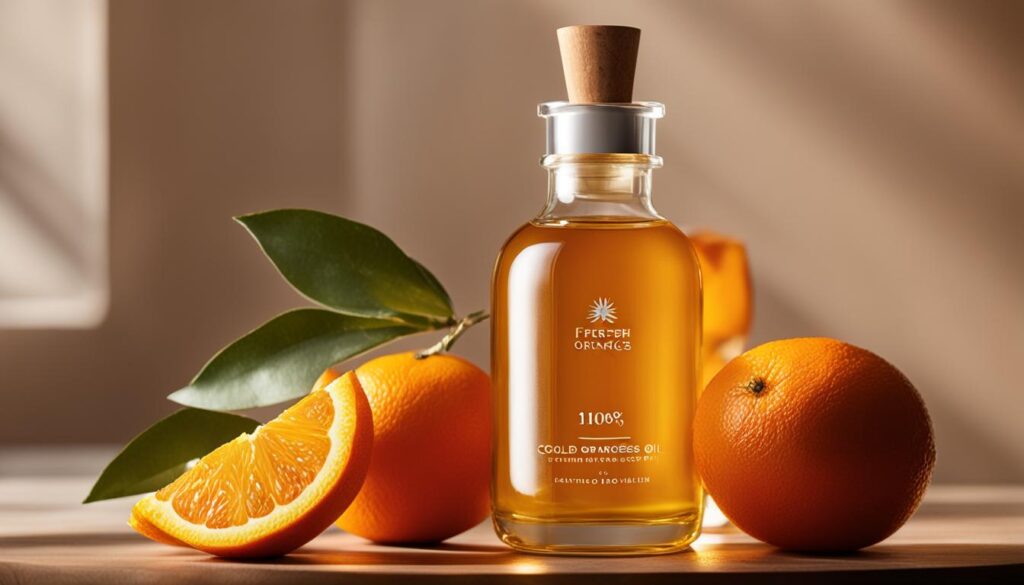Orange essential oil, extracted from the rind of the sweet orange, Citrus sinensis, offers a wide range of uses and benefits. This versatile oil is known for its ability to enhance mood, reduce stress, treat skin conditions, relieve pain and inflammation, and even act as a natural household cleaner. With its pleasant scent and flavorful properties, orange essential oil is a valuable addition to various products and recipes.
Key Takeaways:
- Orange essential oil is extracted from the rind of the sweet orange, Citrus sinensis.
- It can uplift mood, reduce stress, and treat various skin conditions.
- Orange oil has antimicrobial properties and potential benefits for anxiety, pain relief, and cancer prevention.
- It can be used in culinary, personal care, and household applications.
- When purchasing orange essential oil, look for 100% pure oil in dark bottles.
History and Origin of Orange Oil

Orange oil has a rich history that dates back to ancient times. The sweet orange tree, Citrus sinensis, is believed to be a hybrid of the Pummelo and Mandarin botanicals. Oranges were introduced to various regions of the world through trade routes and explorations.
“Oranges have played a significant role in cultures across the globe for centuries. Their vibrant color, refreshing taste, and aromatic properties have made them highly valued commodities.”
In different parts of the world, oranges were highly prized for their medicinal benefits. The oil derived from their peels was traditionally used to treat a variety of ailments.
“Orange oil was celebrated for its therapeutic properties and was commonly used to address colds, coughs, fatigue, depression, and skin infections.”
Orange oil also found its place in culinary and cosmetic applications throughout history. Its distinct flavor and aroma made it a popular choice for enhancing the taste of food and beverages. Likewise, its cleansing and brightening properties made it a valuable ingredient in skincare and cosmetic products.
Properties and Key Components of Orange Oil

Orange oil is known for its diverse range of properties and beneficial effects due to its key chemical constituents. Understanding the properties and key components of orange oil can provide valuable insights into its numerous applications and potential benefits.
Limonene
Limonene is a prominent component of orange oil and is renowned for its antioxidant properties. It acts as a stimulant, aiding in mental focus and reducing fatigue. Limonene also possesses digestive properties, helping to ease indigestion and promote healthy digestion. Additionally, it has detoxifying and appetite suppressant effects, making it a valuable compound in weight management.
β-Myrcene
Another significant component of orange oil, β-myrcene, exhibits anti-inflammatory properties, offering relief from inflammation and associated pain. It also possesses analgesic, antibiotic, and sedative properties, contributing to its potential use in managing various conditions.
α-Pinene
α-Pinene, found in orange oil, is recognized for its anti-inflammatory properties, aiding in the reduction of inflammation. It also acts as an expectorant, helping to clear the respiratory system. With bronchodilator and anti-septic properties, α-pinene supports respiratory health and offers natural defense against respiratory infections.
Citronellol
Citronellol, a key component of orange oil, possesses a wide range of beneficial properties. It exhibits anti-fungal, sedative, anti-viral, anti-microbial, and anti-inflammatory properties. It also offers antioxidant and anti-convulsant effects, making it a valuable addition to various formulations.
Geraniol
Geraniol in orange oil showcases antioxidant properties, playing a crucial role in neutralizing free radicals and protecting the body. It also possesses anti-bacterial and anti-septic properties, contributing to its potential use in personal care products.
Linalool
Linalool, found in orange oil, offers a range of beneficial properties, including sedative, anti-depressant, and anti-inflammatory effects. With anti-anxiety and anti-epileptic properties, linalool may provide support in managing anxiety disorders and epilepsy. It also exhibits analgesic effects, assisting in pain relief.
Neral
Neral is a component of orange oil that exhibits anti-inflammatory effects, contributing to the reduction of inflammation. It also demonstrates apoptotic and anti-nociceptive properties, potentially supporting the management of various health conditions.
The diverse properties and key components of orange oil contribute to its versatility and wide range of applications. Understanding these properties is essential for maximizing the potential benefits of orange oil in various contexts.
| Orange Oil Component | Properties |
|---|---|
| Limonene | Antioxidant, stimulant, digestive, detoxicant, appetite suppressant |
| β-Myrcene | Anti-inflammatory, analgesic, antibiotic, sedative |
| α-Pinene | Anti-inflammatory, expectorant, bronchodilator, anti-septic |
| Citronellol | Anti-fungal, sedative, anti-viral, anti-microbial, anti-spasmodic, anti-inflammatory, anti-oxidant, anti-convulsant |
| Geraniol | Antioxidant, anti-bacterial, anti-septic, analgesic |
| Linalool | Sedative, anti-depressant, anti-inflammatory, anti-anxiety, anti-epileptic, analgesic |
| Neral | Apoptotic, anti-nociceptive, anti-inflammatory |
Natural Usage for Culinary and Personal Products

Orange oil offers a myriad of uses in both culinary and personal care applications. Its vibrant citrus aroma and distinct flavor make it a popular choice for adding a touch of brightness to various dishes and beverages.
Culinary Uses of Orange Oil
When it comes to culinary uses, orange oil can be a versatile addition to your kitchen pantry. It can be used for baking, cooking, and as a natural flavoring agent. Whether you’re whipping up a batch of orange-infused cookies, adding a few drops to a marinade for grilled chicken, or incorporating it into a homemade salad dressing, orange oil can lend a delightful citrusy twist to your favorite recipes.
Personal Products with Orange Oil
Orange oil also finds its way into an array of personal care products, thanks to its beneficial properties for the skin and hair. Its astringent qualities make it an ideal ingredient in soaps, cleansers, toners, and creams, where it helps to cleanse and tone the skin, minimize pores, and brighten the complexion.
In addition to its cleansing properties, orange oil is known for its ability to nourish and hydrate the skin. It can soothe dryness and irritation and promote a healthy, radiant glow. The oil’s antimicrobial properties also make it an effective ingredient in deodorants and oral care products, helping to eliminate harmful bacteria and freshen breath.
Furthermore, orange oil can stimulate collagen production, which can enhance skin elasticity and reduce the appearance of fine lines and wrinkles. Its uplifting aroma can also provide an invigorating and energizing experience in bath and body products, creating a refreshing and revitalizing effect.
In a nutshell, orange oil brings more than just its distinctive flavor to the table. Its inclusion in both culinary and personal care products highlights its versatility and multitude of benefits.
| Culinary Uses | Personal Care Products |
|---|---|
|
|
Household Uses and Other Topical Uses

Orange oil is not just limited to its aromatic and medicinal properties. It can also be effectively utilized in various household and topical applications. Let’s explore some of the versatile uses of orange oil in these areas.
Household Uses
Orange oil is a natural and eco-friendly alternative to conventional household cleaners. Its powerful cleaning properties make it suitable for tackling dirt, grease, and stains on different surfaces. Whether you’re cleaning kitchen countertops, bathroom tiles, or wooden furniture, orange oil can help remove grime effectively and leave surfaces looking refreshed.
In addition to its cleaning abilities, orange oil can also add a lovely and invigorating scent to your cleaning solutions. By incorporating orange oil into your homemade cleaning mixtures, you can not only benefit from its cleansing power but also enjoy a refreshing citrus aroma throughout your home.
With its versatility, orange oil can be effectively used as:
- A surface cleaner for countertops, floors, and appliances.
- A degreaser for removing stubborn grease and oil stains.
- A natural air freshener when mixed with water or diffused.
Other Topical Uses
Beyond its household applications, orange oil offers numerous benefits and uses for personal well-being. Here are some of the other topical applications of orange oil:
- Pain and inflammation relief: Orange oil possesses anti-inflammatory properties that can help soothe muscle aches, joint pain, and reduce inflammation.
- Muscle spasm soothing: The calming effects of orange oil make it an excellent option for relaxing muscle spasms and promoting a sense of tranquility.
- Promoting relaxation: The aroma of orange oil can have a calming effect on the mind and body, helping to reduce stress and anxiety.
- Enhancing oral health: Orange oil contains antimicrobial properties, which can aid in maintaining oral hygiene. It can be used in mouthwashes or for oil pulling to promote a healthy mouth.
- Massage oil: When diluted with a carrier oil, orange oil can be used as a massage oil to nourish the skin, relieve tension, and promote relaxation.
- Additive to bath water: Adding a few drops of orange oil to your bath can create a soothing and aromatic experience, leaving you feeling refreshed and rejuvenated.
With its wide range of household and topical uses, orange oil proves to be a versatile and valuable ingredient to have on hand. From cleaning your home to promoting personal well-being, this natural extract offers a refreshing and effective solution.
Next, we’ll delve deeper into the benefits and applications of orange oil in various aspects of our lives.
| Household Uses | Other Topical Uses |
|---|---|
| As a natural household cleaner | Relieving pain and inflammation |
| Removing dirt, grease, and stains | Soothing muscle spasms |
| Providing a refreshing scent | Promoting relaxation |
| Enhancing oral health | |
| Using as a massage oil | |
| Adding to bath water |
Note: Orange oil can be utilized for both household and topical purposes. It should always be used according to proper dilution and safety guidelines.
Benefits and Application of Orange Oil

Orange oil offers a multitude of benefits that make it a versatile and valuable essential oil. From its antimicrobial properties to its potential for stress reduction and pain relief, orange oil has a wide range of applications. Here are some of the key benefits and ways to use orange oil:
Antimicrobial Activity
Orange oil has been observed to exhibit antimicrobial activity against bacteria and fungi. Its natural properties make it a valuable ingredient in cleansing products and formulas.
Stress and Anxiety Reduction
The uplifting aroma of orange oil is known to have a calming effect on the mind and body. Its refreshing scent can help reduce stress and anxiety levels, promoting a sense of relaxation and well-being.
Pain Relief
Orange oil may provide relief from pain and inflammation due to its analgesic and anti-inflammatory properties. It can be applied topically as a massage oil for soothing relief.
Anticancer and Antioxidant Activity
Research suggests that orange oil exhibits anticancer and antioxidant activity, potentially helping to protect against cellular damage and promote overall health.
Exercise Performance
Orange oil has been studied for its potential to enhance exercise performance. Its stimulating properties may contribute to increased energy and endurance during physical activity.
Potential for Weight Loss
Orange oil has been associated with potential weight loss benefits. Its ability to support a healthy metabolism and suppress appetite may aid in weight management.
Insecticide Activity
Orange oil can serve as a natural insect repellent due to its insecticidal properties. It can be used in sprays or diffused to keep pests at bay.
Immune-Boosting Properties
With its high content of antioxidants, orange oil can help boost the immune system and protect against harmful pathogens. Its immune-boosting properties make it a valuable addition to wellness routines.
Improved Sleep
Orange oil’s calming and soothing properties make it an ideal choice for promoting a restful night’s sleep. Its gentle aroma can help create a tranquil environment for relaxation.
Application of Orange Oil
Orange oil can be applied in various ways to harness its benefits. Here are some common methods of application:
- Diffusion: Add a few drops of orange oil to a diffuser or vaporizer to fill the air with its refreshing aroma.
- Sprays: Create your own natural room or linen spray by diluting orange oil with water in a spray bottle.
- Massage: Mix orange oil with a carrier oil, such as coconut or jojoba oil, for a soothing massage experience.
- Oral Care: Incorporate a few drops of orange oil into homemade mouthwash or use it for oil pulling to support oral health.
It is essential to follow safety precautions when using orange oil. Dilute the oil before applying it topically, and avoid contact with the eyes. Store orange oil in a cool, dark place and consult a doctor if pregnant, breastfeeding, or taking medications. Remember, a little goes a long way when it comes to essential oils.
Usage Tips and Cautions for Orange Oil
When it comes to using orange oil, it’s important to follow some usage tips and safety precautions. By doing so, you can ensure a positive and safe experience with this versatile essential oil.
1. Dilute the oil before applying topically: Orange oil is highly concentrated and potent. To prevent skin irritation, it is recommended to dilute it with a carrier oil, such as coconut or jojoba oil, before applying it on the skin.
2. Perform a patch test: Before using orange oil on a larger area of your skin, perform a patch test by applying a small amount of diluted oil on your forearm. Wait for 24 hours and check for any signs of redness, itching, or irritation. If any adverse reactions occur, refrain from using the oil.
3. Avoid using old or oxidized orange oil: Orange oil, like any other essential oil, can oxidize over time. Using old or oxidized orange oil can cause skin sensitization and other adverse effects. Ensure you use fresh, high-quality orange oil for optimal results.
4. Exercise caution in sunlight: Some citrus essential oils, including orange oil, can be phototoxic, meaning they can increase the skin’s sensitivity to sunlight. To avoid potential skin reactions, it is recommended to avoid direct sunlight or UV exposure for 12-24 hours after applying orange oil topically.
5. Keep away from eyes: Orange oil should not come into contact with the eyes, as it can cause irritation. If accidental contact occurs, flush the eyes with plenty of water and seek medical attention if necessary.
6. Store out of reach of children and pets: Essential oils should be stored safely, away from the reach of children and pets. Ensure the bottles are tightly closed and stored in a cool and dry place.
7. Use proper ventilation for aromatherapy: When using orange oil in a diffuser for aromatherapy purposes, make sure the room is well-ventilated to prevent excessive inhalation. If you experience any respiratory discomfort, discontinue use and consult a healthcare professional.
8. Consult a doctor when pregnant, breastfeeding, or taking medications: If you are pregnant, breastfeeding, or taking any medications, it is advisable to consult a healthcare professional before using orange oil. They can provide personalized guidance based on your specific situation.
By following these usage tips and cautions, you can safely and effectively incorporate orange oil into your daily routine and enjoy its numerous benefits.
Best Quality Selection and Storage of Orange Oil

When it comes to purchasing orange oil, selecting the best quality product is essential to ensure maximum benefits and effectiveness. Here are some tips to help you choose the best quality orange oil and properly store it for long-term use:
- Look for 100% Orange Essential Oil: Ensure that the orange oil you purchase is 100% pure and derived from Citrus sinensis, the scientific name for sweet orange. This guarantees the authenticity and purity of the oil.
- Check the Label for Purity: Verify that the label clearly indicates the purity of the orange oil. Reputable brands will clearly state the oil’s purity on the label, giving you confidence in its quality.
- Opt for Dark Bottles: Choose orange oil packaged in dark bottles as they protect the oil from sunlight. Exposure to light can degrade the oil’s quality and reduce its effectiveness.
- Smell the Oil: Before purchasing, smell the orange oil to ensure it has the characteristic and pleasant scent of oranges. This confirms that the oil is pure and has not been adulterated.
- Avoid Medical Claims: Be cautious of products that claim to treat specific health conditions. Orange oil is not approved by the FDA for medical use. Its benefits are primarily associated with its aroma and topical applications.
Note: The FDA has not evaluated orange oil for its potential therapeutic effects. It is always advisable to consult with a healthcare professional for personalized advice and to address specific health concerns.
Once you have selected the best quality orange oil, it is crucial to store it properly to maintain its quality and potency over time. Here are some storage tips:
- Cool and Dark Place: Store orange oil in a cool, dark place, away from heat and light. This helps to prevent oxidation and preserve the freshness of the oil.
- Airtight Glass Bottles: Transfer the orange oil into airtight, dark glass bottles for storage. This helps to protect the oil from exposure to air and light, which can accelerate the degradation process.
Properly stored orange oil can retain its quality for 1-2 years, allowing you to enjoy its aromatic and therapeutic benefits to the fullest.
Storage of Orange Oil
Proper storage of orange oil is essential to maintain its quality and efficacy. To ensure the longevity of your orange oil, it’s important to store it in a cool, dark place, away from heat and light sources. Exposure to heat and light can accelerate the oxidation process and reduce the freshness of the oil.
Airtight, dark glass bottles are recommended for storing orange oil. This type of packaging helps to shield the oil from both light and air, which can degrade its potency. By protecting it from the elements, you can extend the shelf life of your orange oil and preserve its aromatic and therapeutic properties.
It is crucial to keep orange oil out of reach of children and pets. Ingesting essential oils can be harmful, and accidental ingestion should be avoided. By storing the oil in a secure location, you can prevent any potential accidents and ensure the safety of your household.
When stored properly, orange oil can maintain its quality for 1-2 years. Regularly check the oil for any signs of oxidation or spoilage. If the oil has a rancid smell or appears discolored, it is best to discard it and replace it with a fresh bottle.
FAQ
What are some common uses of orange oil?
Orange oil can be used to lift mood, reduce stress, treat skin conditions like acne, reduce pain and inflammation, relieve stomach upset, act as a natural household cleaner, add a pleasant scent to products, and provide flavor to foods and beverages.
Does orange oil have antimicrobial properties?
Yes, orange oil has been observed to exhibit antimicrobial activity against bacteria and fungi.
What are the potential benefits of orange oil?
Orange oil has potential benefits for anxiety and depression, pain relief, anticancer and antioxidant activity, exercise performance, weight loss, insect repellent, and improved sleep.
How can orange oil be used?
Orange oil can be diffused, used in sprays, applied as a massage oil, or used for oral health.
Is it important to dilute orange oil before applying it topically?
Yes, it is important to dilute orange oil before applying it topically to avoid skin irritation.
Is orange oil safe to use in sunlight?
Orange oil, like some other citrus essential oils, can be phototoxic. Therefore, caution should be exercised when using it in sunlight.
What should I look for when purchasing orange oil?
When purchasing orange oil, look for 100% orange essential oil in dark bottles and verify the scientific name on the label.
How should orange oil be stored?
Orange oil should be stored in a cool, dark place, away from heat and light, to maintain its quality.
How long does orange oil typically last?
When stored properly, orange oil can have a shelf life of 1-2 years.






